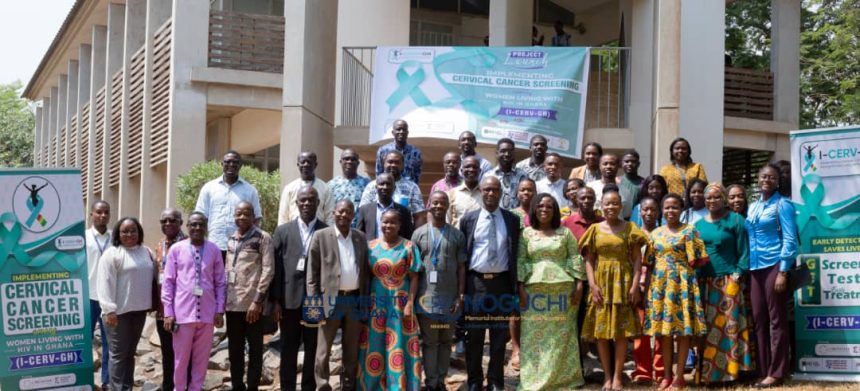The Noguchi Memorial Institute for Research (NMIRM) at the University of Ghana has launched the I-CERV-GH, a cervical cancer project, on January 24, 2024, funded by Expertise France L’Initiative, with the theme ‘Implementing Cervical Cancer Screening Among Women Living with HIV in Ghana’.
The project was launched to tackle the issue of the inadequacy of cervical cancer screening materials in Ghana.
Cervical cancer screening in Ghana is a rather worrisome discussion, considering that the screening is not a routine for most women in Ghana. Given that 90% of cervical cancer deaths worldwide come from Africa and people living with HIV have a higher chance of developing the disease, cervical cancer screening ought to be prioritized. Nonetheless, in Ghana, cervical cancer screening is not accessible to many women as compared to breast cancer screening, which ultimately hinders screening, vaccination, and treatment of this deadly disease.
Chaired by Research Fellow, Medical and Social Anthropology, Institute of African Studies at the University of Ghana, Dr. Deborah Atobrah, the project’s launch was graced with many distinguished guests in the medical field.
In an address, the Principal Investigator of the I-CERV-GH project, Prof. George B. Kyei, gave an overview of the project, stating the importance of cervical cancer screening for all women in Ghana, particularly those living with HIV.
‘’ …women with HIV, even when the virus is fully controlled or the virus is not detectable, are still about six to ten times more likely to develop cervical cancer. When I learned that the screening was not routine for HIV-positive women in Ghana, it’s a little surprising, but if we can get a project that will help us get some data, that will help the country implement and integrate cervical cancer screening into routine care.’’
Prof. Kyei expressed the need to make the project a success by training nurses to perform the screening to be able to detect and treat early lesions, acknowledging the Cervical Cancer Prevention and Training Centre (CCPTC) at Battor and the National AIDS/STD Control Programme for their contributions towards the project.
‘’ …if we are going to be serious about our screening for cervical cancer, there has to be a new module, and this new module is what Dr. Effah and his group at Battor and Cervical Cancer Prevention at the University of Ghana have been championing for the past five to six years or so, where we train nurses to take charge of the screening. If we do that, we will be able to do a lot more, and we can screen more women for cervical cancer.’’
The pilot project would be implemented in some clinics and hospitals nationwide, which include the Korle Bu Teaching Hospital Infectious Disease Centre in Greater Accra, Ewim and Elmina Polyclinic, Cape Coast Metropolitan Hospital in the Central Region, and in the Eastern Region, Atua Government Hospital and ST. Martin de Porres Hospital, Agomanya.
Speaking to the audience, the nurse at the CCPTC Battor, Miss Ethel Tekpor, spoke about the centre and the services they provide, including training nurses to aid in the screening, vaccination, and treatment of early lesions to potentially stop the risk and spread of cervical cancer.
‘’ We began training in 2017, and so far we have trained 344 health workers, including nurses, midwives, doctors, and physician assistants, from all sixteen regions, and out of these sixteen regions, we have trained about 207 institutions. Our training modules are divided into two; each module lasts for two weeks. For module one, we teach our trainees cervical screening and how to set up a cervical screening centre in the institutions. Module two is about treatment.”
“So, when you come for module one, you are only equipped with the knowledge and skills to screen, but you are not equipped with the necessary skills to treat, so module two caters for the treatment. We have developed algorithms, atlases, and apps to create awareness and also guide screening. Our training is not all about theoretical training; we focus on practical and equipping them so that once they go back to their facilities, they will be able to set up and start screening.’’
In her closing remarks, the project’s chair, Dr. Atobrah, highlighted the effect of stigmatisation, particularly for women living with cervical cancer, where she called for the need for cervical cancer screening to be a routine, similarly to breast cancer screenings, in order to stop the spread and risk of the disease.
‘’ This month is cervical cancer month. I don’t know how many of us, if we were not working in space, would have heard about that as much as we do when it is breast cancer awareness month. I do not think this is merely a function of resources but largely a function of how we perceive the condition, which also relates to stigma and how we think that this is contracted, a particular mode that we deem inappropriate.’’
Cervical cancer is caused by the human papillomavirus (HPV), which is acquired through sexual contact. The virus is dependent on how fast the immune system can get rid of it, and if it does not get rid of the virus early, it stays silently on the cervix until many years later, when it causes cancer in some people.
Cervical cancer is preventable, and all women in Ghana are encouraged to get screened, get vaccinated, and get early treatment.










No Comment! Be the first one.